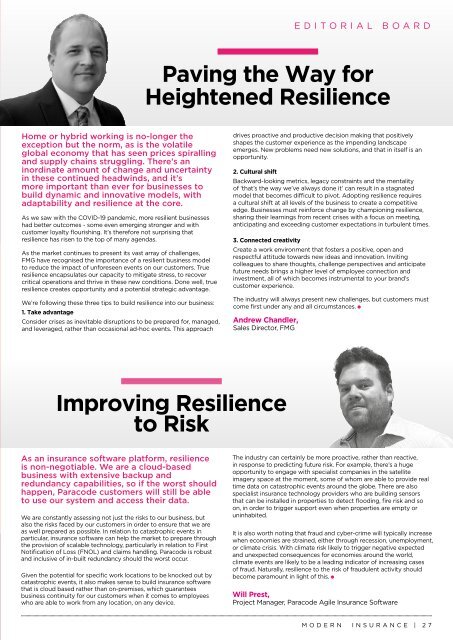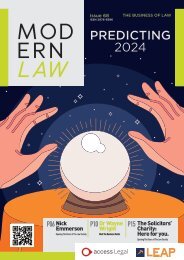Modern Insurance Magazine Issue 60
This issue features... Insight: Every Cloud Has A Silver Lining, by Tim Yeates, Co-Founder, Carbon1 Ltd. Interview: Modelling Modern Risk with Dr Kirsten Mitchell-Wallace, Director of Portfolio Risk Management, Lloyd’s of London Interview: Searching for Answers with Iain Willis, Research Director, Gallagher Research Centre Editorial Board: Find out what our editorial board panel of experts have to say in this edition of Modern Insurance Magazine A Final Word with Steve White, Chief Executive, British Insurance Brokers' Association (BIBA) Is it time for Risk Managers to rethink their role in the Climate Crisis? by François Lanavère, Head of Strategic Partnerships, AXA Climate Associations Assemble: Modern Insurance’s panel of resident associations outline the burning issues in insurance Just a Thought with Eddie Longworth - Building Trust through Responsible AI in Claims: Championing a Voluntary Code of Conduct Making Efficiency Gains in Subsidence Claims, by Chris Carlton MRICS, New Business & Key Account Director, Geobear Chemistry for a Sustainable Future: Q&A with Grant Dempsey, Sales Manager - Distribution, BASF Automotive Refinish UK & Ireland Industry Collaboration: Working together to provide the best mobility solution, with James Roberts, Business Development Director, Insurance, Europcar Mobility Group UK Thinking Upside Down: Mind the Protection Gap, by Ashley Preece, Product Owner, Claim Technology In Conversation with… Neil Garrett, UK, South Africa & Nordics Sales Director, Solera | Audatex A New Climate for Claims, from I Love Claims / ARC 360 10 Mins with… Ola Jacob, Independent Insurance Advisor In Celebration: Modern Claims Awards 2023 Insur.Tech.Talk - Interviews with Stephen Weinstein, Former Chair of the Bermuda Business Development Agency; Bill Churney, President, Extreme Event Solutions, Verisk; Jacqui LeGrand, CEO, Maptycs; Heather H. Wilson, Chief Executive Officer, CLARA Analytics Insur.Tech.Talk Editorial Board - Experts from within the insurtech sector and beyond join us once more to share their unique insights!
This issue features...
Insight: Every Cloud Has A Silver Lining, by Tim Yeates, Co-Founder, Carbon1 Ltd.
Interview: Modelling Modern Risk with Dr Kirsten Mitchell-Wallace, Director of Portfolio Risk Management, Lloyd’s of London
Interview: Searching for Answers with Iain Willis, Research Director, Gallagher Research Centre
Editorial Board: Find out what our editorial board panel of experts have to say in this edition of Modern Insurance Magazine
A Final Word with Steve White, Chief Executive, British Insurance Brokers' Association (BIBA)
Is it time for Risk Managers to rethink their role in the Climate Crisis? by François Lanavère, Head of Strategic Partnerships, AXA Climate
Associations Assemble: Modern Insurance’s panel of resident associations outline the burning issues in insurance
Just a Thought with Eddie Longworth - Building Trust through Responsible AI in Claims: Championing a Voluntary Code of Conduct
Making Efficiency Gains in Subsidence Claims, by Chris Carlton MRICS, New Business & Key Account Director, Geobear
Chemistry for a Sustainable Future: Q&A with Grant Dempsey, Sales Manager - Distribution, BASF Automotive Refinish UK & Ireland
Industry Collaboration: Working together to provide the best mobility solution, with James Roberts, Business Development Director, Insurance, Europcar Mobility Group UK
Thinking Upside Down: Mind the Protection Gap, by Ashley Preece, Product Owner, Claim Technology
In Conversation with… Neil Garrett, UK, South Africa & Nordics Sales Director, Solera | Audatex
A New Climate for Claims, from I Love Claims / ARC 360
10 Mins with… Ola Jacob, Independent Insurance Advisor
In Celebration: Modern Claims Awards 2023
Insur.Tech.Talk - Interviews with Stephen Weinstein, Former Chair of the Bermuda Business Development Agency; Bill Churney, President, Extreme Event Solutions, Verisk; Jacqui LeGrand, CEO, Maptycs; Heather H. Wilson, Chief Executive Officer, CLARA Analytics
Insur.Tech.Talk Editorial Board - Experts from within the insurtech sector and beyond join us once more to share their unique insights!
You also want an ePaper? Increase the reach of your titles
YUMPU automatically turns print PDFs into web optimized ePapers that Google loves.
EDITORIAL BOARD<br />
Paving the Way for<br />
Heightened Resilience<br />
Home or hybrid working is no-longer the<br />
exception but the norm, as is the volatile<br />
global economy that has seen prices spiralling<br />
and supply chains struggling. There’s an<br />
inordinate amount of change and uncertainty<br />
in these continued headwinds, and it’s<br />
more important than ever for businesses to<br />
build dynamic and innovative models, with<br />
adaptability and resilience at the core.<br />
As we saw with the COVID-19 pandemic, more resilient businesses<br />
had better outcomes - some even emerging stronger and with<br />
customer loyalty flourishing. It’s therefore not surprising that<br />
resilience has risen to the top of many agendas.<br />
As the market continues to present its vast array of challenges,<br />
FMG have recognised the importance of a resilient business model<br />
to reduce the impact of unforeseen events on our customers. True<br />
resilience encapsulates our capacity to mitigate stress, to recover<br />
critical operations and thrive in these new conditions. Done well, true<br />
resilience creates opportunity and a potential strategic advantage.<br />
We’re following these three tips to build resilience into our business:<br />
1. Take advantage<br />
Consider crises as inevitable disruptions to be prepared for, managed,<br />
and leveraged, rather than occasional ad-hoc events. This approach<br />
drives proactive and productive decision making that positively<br />
shapes the customer experience as the impending landscape<br />
emerges. New problems need new solutions, and that in itself is an<br />
opportunity.<br />
2. Cultural shift<br />
Backward-looking metrics, legacy constraints and the mentality<br />
of ‘that’s the way we’ve always done it’ can result in a stagnated<br />
model that becomes difficult to pivot. Adopting resilience requires<br />
a cultural shift at all levels of the business to create a competitive<br />
edge. Businesses must reinforce change by championing resilience,<br />
sharing their learnings from recent crises with a focus on meeting,<br />
anticipating and exceeding customer expectations in turbulent times.<br />
3. Connected creativity<br />
Create a work environment that fosters a positive, open and<br />
respectful attitude towards new ideas and innovation. Inviting<br />
colleagues to share thoughts, challenge perspectives and anticipate<br />
future needs brings a higher level of employee connection and<br />
investment, all of which becomes instrumental to your brand’s<br />
customer experience.<br />
The industry will always present new challenges, but customers must<br />
come first under any and all circumstances.<br />
Andrew Chandler,<br />
Sales Director, FMG<br />
Improving Resilience<br />
to Risk<br />
As an insurance software platform, resilience<br />
is non-negotiable. We are a cloud-based<br />
business with extensive backup and<br />
redundancy capabilities, so if the worst should<br />
happen, Paracode customers will still be able<br />
to use our system and access their data.<br />
We are constantly assessing not just the risks to our business, but<br />
also the risks faced by our customers in order to ensure that we are<br />
as well prepared as possible. In relation to catastrophic events in<br />
particular, insurance software can help the market to prepare through<br />
the provision of scalable technology, particularly in relation to First<br />
Notification of Loss (FNOL) and claims handling. Paracode is robust<br />
and inclusive of in-built redundancy should the worst occur.<br />
Given the potential for specific work locations to be knocked out by<br />
catastrophic events, it also makes sense to build insurance software<br />
that is cloud based rather than on-premises, which guarantees<br />
business continuity for our customers when it comes to employees<br />
who are able to work from any location, on any device.<br />
The industry can certainly be more proactive, rather than reactive,<br />
in response to predicting future risk. For example, there’s a huge<br />
opportunity to engage with specialist companies in the satellite<br />
imagery space at the moment, some of whom are able to provide real<br />
time data on catastrophic events around the globe. There are also<br />
specialist insurance technology providers who are building sensors<br />
that can be installed in properties to detect flooding, fire risk and so<br />
on, in order to trigger support even when properties are empty or<br />
uninhabited.<br />
It is also worth noting that fraud and cyber-crime will typically increase<br />
when economies are strained, either through recession, unemployment,<br />
or climate crisis. With climate risk likely to trigger negative expected<br />
and unexpected consequences for economies around the world,<br />
climate events are likely to be a leading indicator of increasing cases<br />
of fraud. Naturally, resilience to the risk of fraudulent activity should<br />
become paramount in light of this.<br />
Will Prest,<br />
Project Manager, Paracode Agile <strong>Insurance</strong> Software<br />
MODERN INSURANCE | 27

















